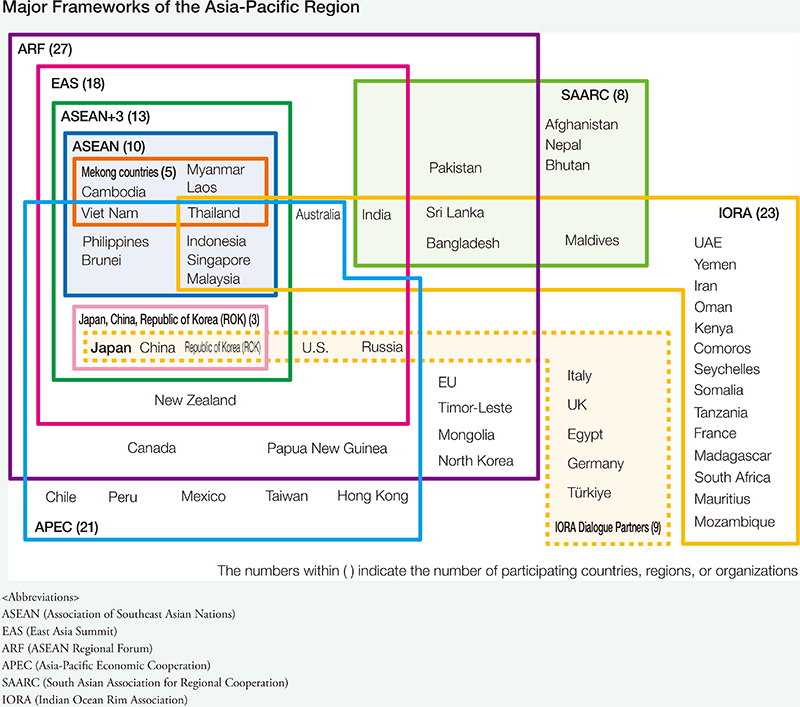Diplomatic Bluebook 2024
Chapter 2
Resilient and Unwavering Regional Diplomacy
7 Regional and Inter-Regional Cooperation
In the Indo-Pacific region, the world's growth center, it is important to ensure peace and prosperity for the entire region, and by extension for the world, by realizing a free and open order based on the rule of law. From this perspective, Japan strategically advances initiatives toward realizing a “Free and Open Indo-Pacific (FOIP)” through various regional cooperative frameworks, including cooperation with like-minded countries such as Australia, India, ASEAN countries, and Europe, Japan-ASEAN, Japan-Mekong cooperation, ASEAN Plus Three (Japan, China and the Republic of Korea (ROK)), East Asia Summit (EAS), ASEAN Regional Forum (ARF), and Asia-Pacific Economic Cooperation (APEC), while maintaining the Japan-U.S. Alliance as the cornerstone of its foreign policy. In particular, the “ASEAN Outlook on the Indo-Pacific (AOIP),”32 adopted by ASEAN in 2019, shares fundamental principles with FOIP, such as openness, transparency, inclusivity, and respect for international law. While respecting the ASEAN centrality and unity, Japan will further expand the support of the international community for AOIP, and intends to implement concrete Japan-ASEAN cooperation conducive to the principles of AOIP, and, as an “Indo-Pacific State,” contribute to the stability and prosperity of the entire Indo-Pacific region.
- 32 AOIP is a guideline for ASEAN's engagement in the Asia-Pacific and Indian Ocean regions, and was adopted at the ASEAN Summit Meeting in June 2019. In addition to strengthening ASEAN centrality in the Indo-Pacific region, AOIP sets out to promote cooperation in areas such as maritime cooperation, connectivity, SDGs, and the economy based on the principles of openness, transparency, inclusiveness, rules-based frameworks, good governance, respect for sovereignty, non-interference, complementarity with existing cooperation frameworks, equality, mutual respect, mutual trust, mutual benefit, and respect for international laws including the UN Charter, the UNCLOS, and other relevant UN conventions.
(1) The Association of Southeast Asian Nations (ASEAN)
Located in the geopolitically important heart of the Indo-Pacific, ASEAN is key to the realization of FOIP. At the ASEAN-related Summit Meetings held in November 2015, ASEAN declared to establish three communities; “ASEAN Political-Security Community,” the “ASEAN Economic Community” and the “ASEAN Socio-Cultural Community” within 2015 (2015 Kuala Lumpur Declaration on the Establishment of the ASEAN Community). Moreover, “ASEAN2025: Forging Ahead Together” was adopted as a guiding policy for the ASEAN Community for the 10 years from 2016 to 2025. In June 2019, the AOIP was adopted.
In East Asia where ASEAN plays an important role as a center of regional cooperation, multi-layered regional cooperation, such as ASEAN Plus Three (Japan, China and the ROK), EAS and ARF, is operating with ASEAN at its center, and cooperative relationships in a wide range of areas including politics, security and the economy have been established.
On the economic front, ASEAN has established the ASEAN Free Trade Area (AFTA) as well as other EPAs and FTAs with various countries including Japan, China, the ROK and India, thereby expanding the ASEAN centered free trade zone. The Regional Comprehensive Economic Partnership (RCEP) Agreement, which consists of ASEAN countries, Japan, Australia, China, the ROK, and New Zealand, entered into force on January 1, 2022. While working closely with participating countries to ensure the transparent implementation of the RCEP Agreement, Japan will continue to play a leading role for the future participation of India in the Agreement, as India declined signing.
(2) Issue of the South China Sea
In the South China Sea, there are issues over sovereignty, and China has been continuing and intensifying its unilateral attempts to change the status quo by force and actions to increase regional tensions against the rule of law and openness, such as further militarization of disputed features (See Chapter 3, Section 1, 3 (4) d ) and coercive actions against coastal countries and other countries. China also has not changed its position of not accepting the Arbitral Tribunal's award33 to the Philippines and China, and has continued to assert maritime claims that are inconsistent with the United Nations Convention on the Law of the Sea (UNCLOS). In 2023, following collisions between the Philippine and Chinese vessels, the Government of the Philippines issued multiple statements condemning the actions of Chinese vessels against Philippine vessels in the South China Sea.
The issue concerning the South China Sea is directly related to the peace and stability of the region and is a legitimate concern of the international community. It is also an important matter of interest for Japan, as Japan relies on sea transport for most of its resources and energy and also is a stakeholder that makes use of the South China Sea.
The international community, including Japan, has expressed serious concerns about China's unilateral attempts to change the status quo and its actions that further increase regional tensions including repeated dangerous actions in the area. Japan strongly opposes unilateral attempts to change the status quo by force and any actions that increase tensions. From the standpoint that the three principles of the rule of law at sea should be consistently adhered to (See Chapter 3, Section 1, 6 (2)), Japan has also consistently emphasized the importance of all the concerned parties related to the South China Sea to work toward peaceful settlement of disputes based on international law, in particular UNCLOS. Additionally, Japan has pointed out that China's assertions regarding baselines in the South China Sea are not based on relevant provisions of UNCLOS and that it is important to protect the freedom of navigation and overflight, including in the sea and airspace surrounding and above maritime features found to be low-tide elevations that do not have territorial sea and territorial airspace of their own according to the award of the Arbitral Tribunal. Japan has also pointed out that the basis of the “historical rights” asserted by China is not clear under international law, and the Arbitral Tribunal ruled that the “historical rights” based on the “nine-dash line” claimed by China were found to be contrary to UNCLOS and were clearly denied. Foreign Minister Hayashi issued a statement reiterating Japan's position on the importance of the rule of law and on the principle of peaceful settlement of disputes in accordance with international law in July 2022 and July 2023, in addition to the statement issued in July 2021, which marked five years since the Arbitral Tribunal's award as to the disputes between the Philippines and China. Coordination among Japan, the U.S., and the Philippines is also being strengthened. In September, Prime Minister Kishida held informal talks with President Marcos and Vice President Harris in Jakarta to discuss the situation surrounding the South China Sea. Japan-U.S.-Philippines Foreign Ministers' Meetings were held in July and September, and, based on the recent severe strategic environment including the situation in the South China Sea, the three ministers concurred to further strengthen coordination among the three countries and promote the materialization of the trilateral cooperation.
In 2018, negotiations on the Code of Conduct (COC) in the South China Sea commenced between China and ASEAN. At the ASEAN-China Foreign Ministers' Meeting in July, the second reading of the draft COC and the adoption of “Guidelines” to accelerate the early conclusion of the COC were announced, drawing expectation of some progress in the negotiations. Japan has stated its position that the COC should be effective, substantive, consistent with UNCLOS, and respect the legitimate rights and interests of all stakeholders that make use of the South China Sea.
- 33 In January 2013, the Government of the Philippines instituted arbitral proceedings under UNCLOS as to the disputes between the Philippines and China regarding the South China Sea. The Arbitral Tribunal organized by these proceedings rendered the final award on July 12, 2016. Japan issued a statement by the Foreign Minister on the same day, stating, “As the Tribunal's award is final and legally binding on the parties to the dispute under the provisions of UNCLOS, the parties to this case are required to comply with the award. Japan strongly hopes that the parties' compliance with the award will eventually lead to the peaceful settlement of disputes in the South China Sea.”
(3) Japan-ASEAN Relations
Realizing a more stable and prosperous ASEAN, the key to the realization of FOIP, is absolutely essential to the stability and prosperity of the region as a whole. Japan is actively supporting ASEAN's efforts in accordance with “ASEAN Community Vision 2025” for further integration even after the establishment of the ASEAN Community, while steadily implementing the “Vision Statement on ASEAN-Japan Friendship and Cooperation” adopted at the ASEAN-Japan Commemorative Summit to commemorate the 40th Year of ASEAN-Japan Friendship and Cooperation in 2013. Furthermore, based on the “Joint Statement of the 23rd ASEAN-Japan Summit on Cooperation on ASEAN Outlook on the Indo-Pacific,” adopted in 2020, Japan has been building up concrete cooperation in line with AOIP's priority areas of maritime cooperation, connectivity, the Sustainable Development Goals (SDGs), and economic and other possible areas of cooperation. The Statement was the first joint statement on AOIP adopted by ASEAN with external partners, and has been followed by similar joint statements between ASEAN and other dialogue partners. In March 2023, marking the 50th Year of ASEAN-Japan Friendship and Cooperation, Prime Minister Kishida announced a new plan for FOIP, clearly positioning Southeast Asia as an important region, and announced a new contribution of 100 million U.S. dollars to the Japan-ASEAN Integration Fund (JAIF) and a revamp of the Japan-ASEAN Connectivity Initiative.
Japan's consistent support for ASEAN centrality and unity was reaffirmed in July at the ASEAN-Japan Foreign Ministers' Meeting by Foreign Minister Hayashi and in September at the ASEAN-Japan Summit by Prime Minister Kishida. In particular, at the ASEAN-Indo-Pacific Forum (AIPF) that was held as a side event to the ASEAN-related Summit Meetings in Jakarta in September, the Japan-ASEAN Comprehensive Connectivity Initiative was newly announced to further strengthen connectivity through both hard and soft cooperation. Furthermore, at the ASEAN-Japan Summit in September, a Joint Statement was adopted to establish the ASEAN-Japan Comprehensive Strategic Partnership (CSP).
ASEAN countries expressed their appreciation for Japan's longstanding cooperation in a wide range of areas, its support for ASEAN centrality and the AOIP and its contribution of 100 million U.S. dollars to the JAIF. In addition, they welcomed the establishment of the CSP and the ASEAN-Japan Comprehensive Connectivity Initiative and also expressed their appreciation to the Asia Zero Emission Community (AZEC) initiative. ASEAN countries also mentioned synergy effects between FOIP and AOIP. Many ASEAN leaders also expressed their hope that the Commemorative Summit in December 2023 would set out a new vision for the relationship and further strengthen it.
Prime Minister Kishida also addressed the regional and international situation, noting that, in order for the region to remain as a center of growth, it is essential that peace and stability be maintained in the regional and international community. He also addressed and clearly stated Japan's position including on Myanmar, Russia's aggression against Ukraine, the East China Sea and the South China Sea, the importance of peace and stability across the Taiwan Strait, economic coercion, North Korea, and ALPS treated water.
In response, ASEAN countries emphasized the importance of freedom of navigation and overflight in the South China Sea, the importance of international order based on the rule of law, and the importance of denuclearization of the Korean Peninsula and resolution of the abductions issue.
In December, the Commemorative Summit for the 50th Year of ASEAN-Japan Friendship and Cooperation was held in Tokyo; after recapping the past half century of ASEAN-Japan relations, the Joint Vision Statement on ASEAN-Japan Friendship and Cooperation, which set out a new vision for cooperation, and its Implementation Plan were adopted. The Joint Vision Statement, subtitled “Trusted Partners,” indicates that the trust built over a half century is the foundation of ASEAN-Japan relations. It also set forth the vision of the world that ASEAN and Japan aspire to, in which all nations can pursue peace and prosperity, and the principles of democracy, the rule of law, good governance, and respect for human rights and fundamental freedoms are upheld. Prime Minister Kishida indicated that ASEAN and Japan would, first, pass on and strengthen their longstanding relationship of trust to the next generation as “Heart-to-Heart Partners across Generations;” second, find solutions to common challenges as “Partners for Co-creation of Economy and Society of the Future;” and third, promote a Free and Open Indo-Pacific as “ Partners for Peace and Stability.” Furthermore, Japan announced the following concrete actions for these pillars. First, it will launch the “Partnership to Co-create a Future with the Next Generation: WA Project 2.0,” a comprehensive people-to-people exchange program including intellectual/cultural exchanges and NIHONGO (Japanese language) Partners, and will further promote two-way exchanges with young business leaders and others. Second it will further encourage private sector investment by utilizing new ODA initiatives, such as Co-creation for Common Agenda Initiative, with an emphasis on strengthening connectivity, combating climate change including AZEC initiative, and supporting small, medium, and micro enterprises and startups, while working on cooperation between the public and private sectors, and launch the “ASEAN-Japan Co-Creation Initiative for the Next-Generation Automotive Industry.” Third it will promote the development of nuclear disarmament and non-proliferation based on the “Hiroshima Action Plan”; cooperation on law and justice; Women, Peace and Security (WPS); cybersecurity; and defense cooperation exchanges; and Official Security Assistance (OSA).
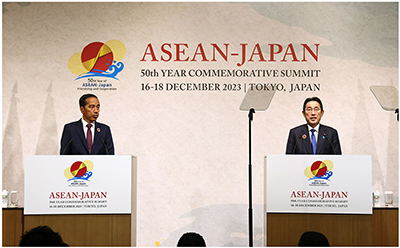 Prime Minister Kishida attending a joint press conference with Indonesian President Joko, who served as co-chair at the Commemorative Summit for the 50th Year of ASEAN-Japan Friendship and Cooperation (December 17; Photo: Cabinet Public Affairs Office)
Prime Minister Kishida attending a joint press conference with Indonesian President Joko, who served as co-chair at the Commemorative Summit for the 50th Year of ASEAN-Japan Friendship and Cooperation (December 17; Photo: Cabinet Public Affairs Office)In response, ASEAN countries expressed their great appreciation for the achievements of the long-standing ASEAN-Japan cooperation in a wide range of fields. They also expressed high expectations for Japan's new initiatives. At the Commemorative Summit, regional and international situations were also addressed in discussions about the three pillars mentioned above, and Prime Minister Kishida reiterated Japan's position, stating that it is essential to uphold and reinforce the free and open international order based on the rule of law (See the Special Feature on page 96).
●The Commemorative Summit for the 50th Year of ASEAN-Japan Friendship and Cooperation
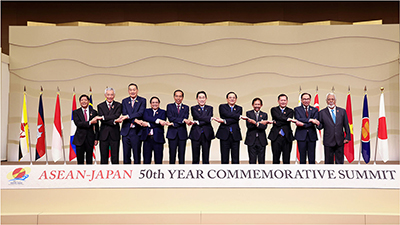 ASEAN-way group photo at the Commemorative Summit (December 17, Tokyo. Photo: Cabinet Public Affairs Office)
ASEAN-way group photo at the Commemorative Summit (December 17, Tokyo. Photo: Cabinet Public Affairs Office)In 2023, Japan and the Association of Southeast Asian Nations (ASEAN) celebrated the historic milestone of 50 years of friendship and cooperation. In December, ASEAN leaders were invited to Tokyo to hold the Commemorative Summit, where they adopted the Joint Vision Statement, which outline a new vision for cooperation, and the Implementation Plan for it (See Chapter 2, Section 2-7 (3)).
●The Development of ASEAN-Japan Relations
Japan initiated dialogue with ASEAN in 1973, ahead of the rest of the world. In the half century since then, ASEAN has expanded, integrated, and dramatically developed. Although ASEAN-Japan relations have had many twists and turns, Japan has supported ASEAN's own initiatives in various fields through development cooperation and has walked together with ASEAN on the path to development and integration. Japan has also been ASEAN's major trading partner and direct investor for many years. In recent years, Japan has made an average of approximately 2.8 trillion yen in direct investments per year in ASEAN countries. Furthermore, there are approximately 15,000 Japanese companies operating in ASEAN countries, where they produce products, provide services, and create jobs, thereby contributing to economic development while also playing a role in incorporating the vitality of the rapidly growing ASEAN into the Japanese economy.
The relationship between ASEAN and Japan goes beyond business. It is a relationship of mutual trust that is based on heart-to-heart contact. This relationship has been nurtured through cooperation and exchanges in a wide range of fields over the years since the “Fukuda Doctrine”1 of 1977.
ASEAN and Japan have also reached out to each other in times of great hardship, such as the Asian financial crisis, the Sumatra Earthquake and Indian Ocean Tsunami, the Great East Japan Earthquake, and, more recently, the global spread of the COVID-19 pandemic. Thanks to this accumulated history of cooperation, for the fifth year in a row, a survey by a well-known ASEAN think tank has ranked Japan as ASEAN's most reliable partner amongst major countries.
●Challenges Facing ASEAN and Japan
The international community is currently at a turning point in history, with the free and open international order based on the rule of law facing serious challenges. The world is also being confronted by complex and interrelated challenges, including climate change, disparities, public health crises, digitalization, and AI governance.
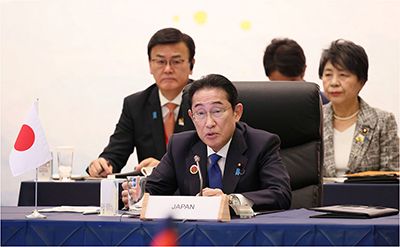 Prime Minister Kishida, co-chair (December 17, Tokyo. Photo: Cabinet Public Affairs Office)
Prime Minister Kishida, co-chair (December 17, Tokyo. Photo: Cabinet Public Affairs Office)In this context, ASEAN and Japan, which share fundamental principles such as a prohibition on the use of force, the rule of law, good governance, democracy, fundamental freedom and human rights, are being called upon to cooperate more closely than ever before.
ASEAN is the cornerstone to achieving a “Free and Open Indo-Pacific (FOIP)” based on the rule of law, which Japan advocates. Japan has strongly and consistently supported ASEAN Centrality and unity, and will support the mainstreaming of the “ASEAN Outlook on the Indo-Pacific (AOIP).”
●The Future of ASEAN-Japan Relations
In 2023, a total of 13 ministerial-level meetings were held between ASEAN and Japan, demonstrating the breadth of their cooperation. Numerous commemorative events and exchange programs were also held by both the public and private sectors.
The Joint Vision Statement that was adopted at the Commemorative Summit to conclude this 50th year, states (1) that as “Heart-to-Heart Partners across Generations,” ASEAN and Japan will strengthen and pass on their long-standing relationship of trust to the next generation; (2) that as “Partners for Co-creation of Economy and Society of the Future,” ASEAN and Japan will find solutions to common challenges; and (3) that as “Partners for Peace and Stability,” ASEAN and Japan will promote FOIP. Going forward, Japan will continue to work with ASEAN as a “Trusted Partner” to “co-create” peace and stability in the region and the world and a sustainable and prosperous future.
- 1 The three ASEAN diplomatic principles that Prime Minister FUKUDA Takeo announced during his visit to Manila in the Philippines are that (1) Japan will never be a military power, (2) Japan will establish a “Heart-to-Heart” relationship with ASEAN, and (3) Japan and ASEAN are equal partners.
(4) Mekong-Japan Summit Meeting (Participating Countries: Cambodia, Laos, Myanmar, Thailand, Viet Nam and Japan)
The Mekong region (Cambodia, Laos, Myanmar, Thailand and Viet Nam) is the core of the Indo-Pacific and is Japan's Strategic Partner with strong economic growth and potential. Peace and prosperity in the Mekong region are extremely important to Asia as a whole, including Japan, since it contributes to narrowing the development gap in the region and promoting regional integration within ASEAN. From this perspective, Japan has been holding the Mekong-Japan Summit Meeting every year since 2009. Although since 2021 the Mekong-Japan Summit Meetings were postponed due to circumstances such as the COVID-19 pandemic and the situation in Myanmar, Japan will continue to steadily implement Mekong-Japan cooperation and to maintain its steadfast commitment to the region. Japan will continue to contribute to the prosperity and development of the region as a reliable partner for Mekong region countries.
(5) ASEAN Plus Three (Participating Countries: 10 ASEAN countries and Japan, China and the ROK)
The ASEAN Plus Three was established in 1997, when the Asian financial crisis triggered the addition of three countries (China, Japan, and the ROK) to ASEAN. ASEAN Plus Three has developed with a focus on areas such as finance and food security. Today, it covers cooperation in 24 areas, including finance, agriculture and food, education, culture, tourism, health, energy and the environment. Further cooperation is progressing in each area under the “ASEAN Plus Three Cooperation Work Plan (2023-2027).”
At the ASEAN Plus Three Foreign Ministers' Meeting held in July, Foreign Minister Hayashi stated that Japan would continue to fully support the mainstreaming of the AOIP, and promote concrete cooperation in the four priority areas of the AOIP as follows: (a) Maritime cooperation: Training operators to support maritime navigation, and supporting the formulation of plans for measures against marine plastic waste, and supporting marine monitoring; (b) Connectivity: Planning renewal of the Japan-ASEAN Connectivity Initiative; (c) SDGs: Implementing support for ASEAN Plus Three Emergency Rice Reserve (APTERR) and the ASEAN Food Security Information System (AFSIS), the early operation of the ASEAN Centre for Public Health Emergencies and Emerging Diseases (ACPHEED), and measures to address climate change; and (d) Economy and finance: Contributing to discussions on Disaster Risk Financing (DRF), Asian Bond Markets Initiative (ABMI) and the impact of financial digitalization in the region. Foreign Minister Hayashi also clearly explained Japan's position that ALPS treated water will be discharged into the sea in accordance with international standards and practices, taking into consideration the conclusion of the IAEA Comprehensive Report.
At the ASEAN Plus Three (Japan-China-ROK) Summit, Prime Minister Kishida stressed the importance of upholding and reinforcing the free and open international order based on the rule of law in order for the Indo-Pacific region to remain an “Epicentrum of Growth.” As examples of Japan's positive contributions to ASEAN Plus Three, he introduced Japan's efforts in regional financial cooperation, food security, and post-COVID-19 measures, noting Japan's support for ASEAN centrality and unity and the importance that Japan places on cooperation in line with the AOIP.
Regarding regional and international issues, Prime Minister Kishida clearly stated Japan's position on the situations in North Korea and Myanmar and called for the continued understanding and cooperation toward the immediate resolution of the abductions issue. He also explained that the discharge of ALPS treated water into the sea has been conducted in full accordance with international standards and practices. Finally, Prime Minister Kishida expressed his determination to strengthen cooperation under ASEAN+3 so that ASEAN will take the lead in efforts to uphold and reinforce the free and open international order based on the rule of law.
(6) East Asia Summit (EAS) (Participating Countries: 10 ASEAN countries and Japan, China, the ROK, Australia, New Zealand, India, the U.S. and Russia)
EAS was launched in 2005 with the aim of implementing strategic dialogue and cooperation on political, security, and economic issues of common concern to the region. As the region's premier Leaders-led forum, it is expected that EAS will contribute to maintaining and strengthening a free and open international order based on the rule of law.
At the EAS Foreign Ministers' Meeting held in July, Foreign Minister Hayashi emphasized the importance of the free and open international order based on the rule of law, stated that unilateral attempts to change the status quo by force should never be tolerated anywhere in the world, and stated Japan's position on Russia's aggression against Ukraine, the Taiwan Strait, the situation in North Korea including the abductions issue, the situation in the East China Sea and the South China Sea, and the situation in Myanmar. He also clearly explained Japan's position on the discharge of ALPS treated water into the sea.
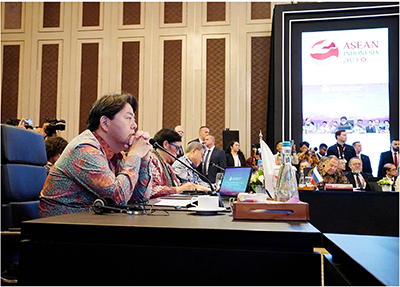 Foreign Minister Hayashi attends the 13th EAS Foreign Ministers' Meeting (July 14, Jakarta, Indonesia)
Foreign Minister Hayashi attends the 13th EAS Foreign Ministers' Meeting (July 14, Jakarta, Indonesia)At the 18th EAS held in September, Prime Minister Kishida expressed Japan's support for ASEAN centrality and unity as well as the mainstreaming of AOIP; and pointed out that it is even more important to realize an international community characterized by cooperation, not division and confrontation, through upholding and reinforcing the free and open international order based on the rule of law. He also stated that Japan opposes unilateral attempts to change the status quo by force anywhere in the world.
As for regional and international issues, Prime Minister Kishida pointed out that the global economy has facing increasingly serious challenges by Russia's aggression against Ukraine, and underlined the need for the immediate withdrawal of Russian troops and the importance of achieving a just and lasting peace in Ukraine. He also stressed that Japan absolutely cannot accept Russia's nuclear threats, let alone its use of nuclear weapons under any circumstances, and will promote realistic and practical efforts toward the realization of a world without nuclear weapons under the “Hiroshima Action Plan.”
With regard to North Korea, he expressed serious concern over its intensified nuclear and missile activities and stated that it is essential for the international community to be united and to fully implement UN Security Council resolutions in order to achieve the complete, verifiable, and irreversible dismantlement (CVID) of all of North Korea's weapons of mass destruction and ballistic missiles of all ranges. He also called for continued understanding and cooperation toward the immediate resolution of the abductions issue.
Prime Minister Kishida stated that he strongly opposes the continued and intensified activities in the East China Sea that infringe upon Japan's sovereignty. He also pointed out that militarization and coercive activities are continuing in the South China Sea, and that claims of maritime rights and activities in the sea should be conducted in accordance with the relevant provisions of UNCLOS. He pointed out the importance of peace and stability across the Taiwan Strait, and stated that Japan would engage itself in mutual efforts to build a “constructive and stable relationship” between Japan and China, together with President Xi Jinping, and that Japan would continue to have close communication at all levels for this purpose.
As for Myanmar, Prime Minister Kishida expressed serious concern over the continued deterioration of the situation in Myanmar and the lack of political progress, including the release of detainees such as State Counsellor Aung Saung Suu Kyi, and stated that he would provide maximal support to ASEAN efforts to resolve the situation.
Finally, he explained that the discharge of ALPS treated water into the sea is being conducted in accordance with international standards and practices, with full precautions being taken to ensure safety.
(7) Japan-China-ROK Trilateral Cooperation
Trilateral cooperation among Japan, China and the ROK continues to be vital from the perspective of promoting exchanges and mutual understanding among the three countries that enjoy geographical proximity and share deep historical ties. Furthermore, as the three countries play a major role in the world economy and serve as the force driving prosperity of the East Asian region, the trilateral cooperation has huge potential in efforts to tackle various issues in the international community.
On November 26, a Japan-China-ROK Trilateral Foreign Ministers' Meeting was held in Busan, ROK for the first time in four years. At the meeting, the three ministers reaffirmed the importance of promoting a future-oriented and practical cooperation between Japan, China and the ROK for peace and prosperity of the region and beyond from a broad perspective. The three ministers also concurred on advancing efforts in various areas such as (a) people-to-people exchange, (b) science and technology, (c) sustainable development, (d) public health, (e) economic cooperation and trade, and (f) peace and security as the future direction of concrete cooperation, and promoting concrete discussions among the three countries in preparation for the next Summit.
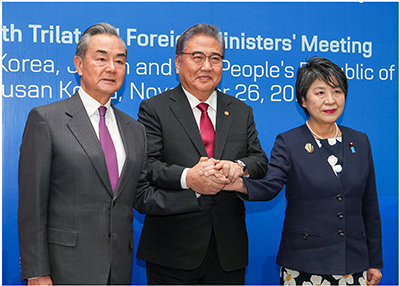 The Tenth Japan-China-ROK Trilateral Foreign Ministers' Meeting (November 26, Busan, ROK)
The Tenth Japan-China-ROK Trilateral Foreign Ministers' Meeting (November 26, Busan, ROK)In terms of regional and global situations, the foreign ministers also discussed current international situations, including North Korea's launch on November 21, using ballistic missile technology for the purpose of a satellite launch, the Israel-Palestine situation, and Russia's aggression against Ukraine. Regarding North Korea in particular, Foreign Minister Kamikawa stated that we should firmly make efforts toward the complete denuclearization of the Korean Peninsula, including through the full implementation of the UN Security Council resolutions, and once again asked for continued understanding and cooperation from China and the ROK toward the immediate resolution of the abductions issue.
(8) Asia-Pacific Economic Cooperation (APEC) (See Chapter 3, Section 3, 3 (3) )
Consisting of 21 economies (countries and regions) in the Asia-Pacific region, APEC promotes regional economic integration and cooperation across the region among the member economies on a voluntary basis. As the Asia-Pacific region is positioned as the “world's growth center,” strengthening economic cooperation and trust in economic aspects in this region is crucial in pursuing Japan's further economic development.
At the APEC Leaders' Meeting held in San Francisco, U.S. in November, the leaders adopted the “Golden Gate Declaration,” and the U.S. released a Chair's Statement on the situation in Ukraine and the Israel-Palestinian situation. Prime Minister Kishida, who attended the Summit, expressed his determination to contribute to sustainable growth in the Asia-Pacific region.
(9) South Asian Association for Regional Cooperation (SAARC)
SAARC was officially inaugurated in 1985 with multiple objectives such as enhancing the welfare of citizens of the South Asian countries, and cooperation and collaboration in economic and social development and cultural areas. As of December 2023, SAARC has eight member states (India, Pakistan, Bangladesh, Sri Lanka, Nepal, Bhutan, the Maldives and Afghanistan) and nine observer countries and institutions including Japan. As a relatively loose framework of regional cooperation, SAARC has worked primarily on economic, social and cultural areas, through summit meetings and meetings of the Council at the ministerial level (Foreign Ministers' meetings). However, no Summit Meeting has been held since 2014, and no Ministerial Meeting has been held since 2016. As part of the youth exchange between Japan and SAARC, Japan has invited 8,758 people as of the end of 2023.
(10) Indian Ocean Rim Association (IORA)
IORA is a regional organization whose main purpose is to promote economic cooperation in the Indian Ocean rim region, and Japan has been participating as a dialogue partner country since 1999. Parliamentary Vice-Minister for Foreign Affairs KOMURA Masahiro attended the 23rd IORA Meeting of the Council of Ministers held in October and gave a speech stating that Japan will continue to cooperate with IORA as a partner country to realize FOIP.
